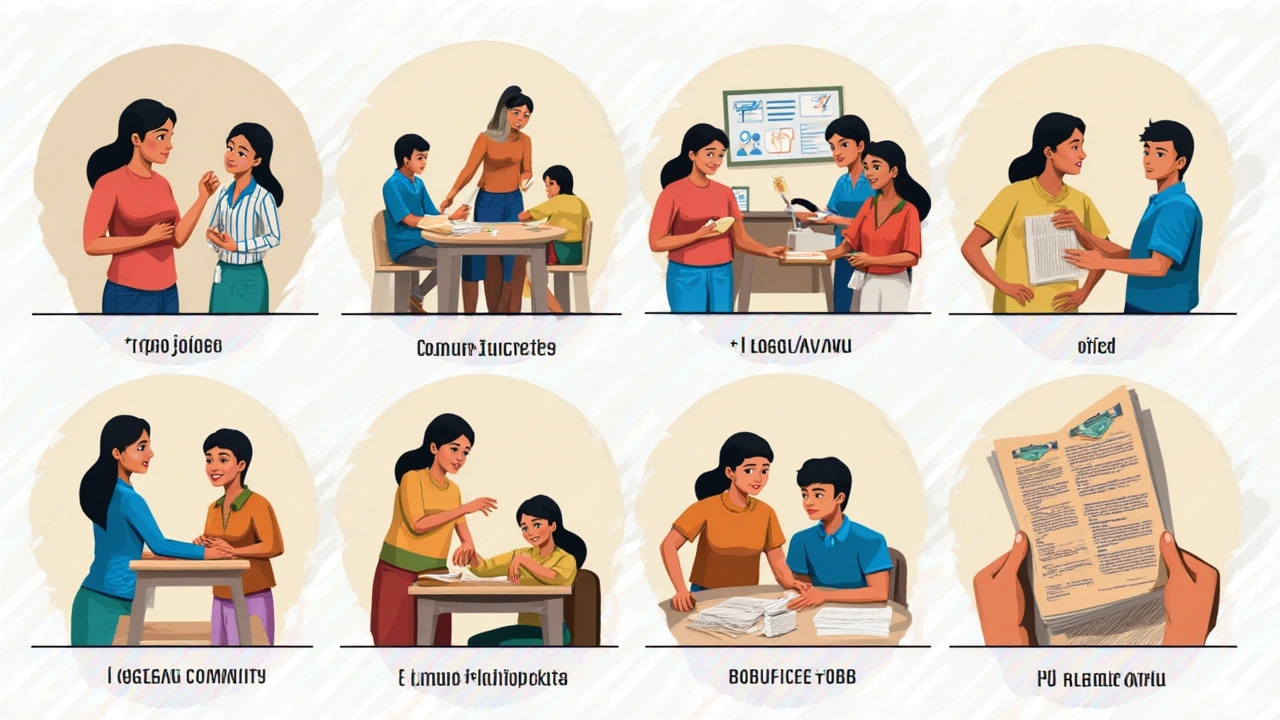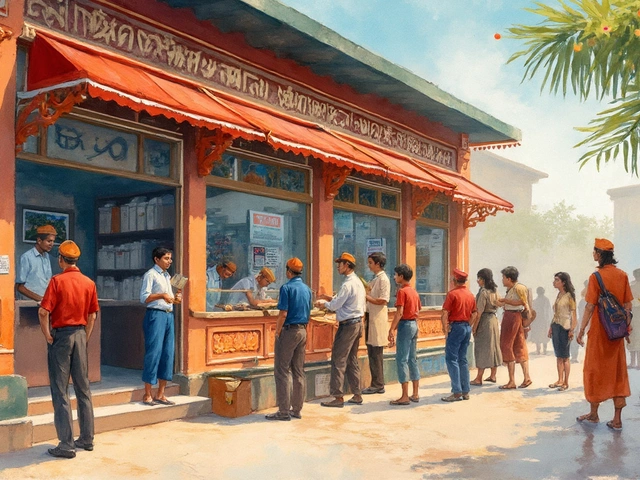
Thinking about working in local government? You’re not alone. These jobs are known for stability and benefits, sure, but they’re also loaded with real-world impact. If you’ve ever wondered how potholes get filled, or who keeps parks tidy, that’s local government at work. The thing is, landing your first gig doesn’t take an insider connection or a cousin in city hall—it takes a bit of strategy and some know-how.
Most people have no clue where to even look for these jobs. The good news: there’s no secret handshake. City councils, counties, and school boards all post upcoming openings online. Entry-level spots range from administrative assistants to public works and libraries—most don’t need fancy degrees. The key is understanding what each role actually does, which ones match your skills, and how the application process works.
- Understanding Local Government Roles
- What Skills Actually Matter?
- Finding and Applying for Openings
- How to Stand Out From the Crowd
- What Happens After You’re Hired?
Understanding Local Government Roles
Local government does a lot more than people think. We're talking about city, town, and county jobs that keep your neighborhood running. These jobs handle everything from public safety and trash pickup to libraries and fixing the roads. Each department covers a different piece of daily life, and that's what makes these roles so varied and interesting.
If you’re new to this, here’s a quick breakdown of the types of departments you’ll find in most local governments:
- Public Works: Handles roads, water, snow removal, and city vehicles. Without these guys, nothing functions.
- Parks and Recreation: Runs local parks, sports leagues, pools, and rec centers.
- Clerical/Admin: Processes paperwork, helps residents at the front desk, handles licenses and permits, schedules meetings.
- Finance/Budget: Tracks spending, collects local taxes, makes sure money goes where it should.
- Community Development & Planning: Deals with building permits, land use, and zoning. They decide if you can build that backyard shed.
- Library Services: Keeps the library running. Patrons, book orders, events, and community programs.
- Public Safety: Police, fire department, emergency services.
Most people start in entry-level government jobs like office assistant, customer service rep, junior planner, grounds crew, or library technician. These don’t require a four-year degree. For example, about 57% of entry roles just ask for a high school diploma or equivalent, according to a 2023 Bureau of Labor Statistics survey.
| Department | Common Entry-Level Roles | Minimum Ed. Needed |
|---|---|---|
| Parks & Recreation | Recreation Aide, Maintenance Worker | High School Diploma |
| Clerical/Admin | Office Assistant, Receptionist | High School Diploma |
| Public Works | Laborer, Water Operator | High School Diploma/License |
| Library | Library Assistant | High School Diploma |
| Finance | Accounts Clerk | Associate's Degree |
The job titles may be different where you live, but the work stays pretty similar. Check your city or county's official website for job boards. These spots usually get filled by locals, so it’s easier to break in than with a federal or state gig. A lot of folks skip applying because they assume local government means politics. It’s really about service—fixing problems your neighbors notice every day.
What Skills Actually Matter?
If you want to break into a local government job, you won’t need a flawless resume or fancy certificates to get started. What hiring teams really want to see are practical, everyday skills that keep things running. People often think it’s all about degrees, but according to City Personnel’s 2024 Government Hiring Report, 63% of entry-level government jobs just want solid communication and basic tech abilities before anything else.
Here’s what usually stands out:
- Communication: You’ll spend your days talking with people, writing emails, and solving problems. If you can break down tricky stuff in a simple way, you’re already valuable.
- Organization: Government jobs mean piles of paperwork and deadlines. Being on top of things is a must—think calendars, spreadsheets, and quick note-taking.
- Problem-solving: Issues pop up every day, and nobody has a manual. If you can figure out solutions fast, you’ll stand out.
- Teamwork: Most projects run in groups, not solo. Being reliable and easy to work with goes a long way in city departments.
- Tech Savvy: Nearly every office runs on computers. Familiarity with email, online forms, and Microsoft Office isn’t optional anymore.
Does that seem basic? Maybe, but according to HR managers surveyed by ICMA, more than half of entry-level hires struggle most with time management once on the job.
"We can train someone on our systems, but we can’t teach strong communication or dependability. That’s what we’re looking for right from the interview." — Carla Messina, HR Director, City of St. Louis
If you’re worried your resume won’t stack up, remember many departments run "skills assessments" instead of classic interviews now. You might get a sample case or a typing test. Brush up ahead of time—YouTube’s packed with practice clips for government tests.
| Skill | % of listings requiring it |
|---|---|
| Communication | 88% |
| Organization | 73% |
| Teamwork | 66% |
| Microsoft Office | 62% |
| Customer Service | 55% |
If you can back up these skills with real stories—maybe you helped organize a school event, handled complaints at a retail job, or juggled lots of tasks at once—you’re half way there. When you’re prepping for applications, focus on these skills and come ready to show how you use them every day.

Finding and Applying for Openings
Getting a foot in the door with local government jobs isn’t nearly as mysterious as it seems. First up, skip the national job boards for now. Most city or county governments have their own careers page, usually found right on their main website. Some states also roll openings into a single site—Texas has ‘WorkInTexas.com,’ and California uses ‘CalCareers’ for public jobs, including local.
And here’s the thing: local government openings are filled by real deadlines, not whenever they find someone. Set up alerts on those official sites or check back every Monday. This isn’t like the private sector where you can cold-email your way in; most public openings must be posted publicly for fairness, so you’re not missing out on secret jobs.
Common entry-level listings include:
- Administrative Assistant
- Parks Maintenance Worker
- Library Clerk
- City Planning Assistant
- Public Safety Dispatcher
Each job has strict requirements. Some just ask for a high school diploma or GED. Others want you to pass a basic skills test or get fingerprinted. Double-check the posted qualifications before you spend time filling out the app.
The local government jobs application process almost always follows the same path:
- Create an account. Most government sites have you set up a profile, which you’ll use to keep everything organized and track your applications.
- Upload a resume. Don’t use your regular resume; tailor it to that specific role. Use keywords from the job post, because many systems scan resumes before a real person sees them.
- Answer supplemental questions. These are short essay questions or multiple choice. Be specific—examples from school, volunteering, or other jobs all count.
- Watch for testing invites. Some spots—like admin or clerical—need you to pass a test. It’s usually online, covering grammar, logic, or basic math.
Miss a deadline and you’re out—government jobs don’t bend the rules, even by a minute. Mark your calendar and set phone reminders. Expect to wait at least two to four weeks for a response, sometimes longer.
| Step | Common Wait Time | Notes |
|---|---|---|
| Application Submission | 1 day | Apply as soon as possible before deadline |
| Screening/Testing | 2-4 weeks | Watch email for tests and instructions |
| Interview Scheduling | 1-3 weeks later | May be virtual or in-person |
| Final Hiring Decision | 2-6 weeks after interview | References and background check done here |
Want to boost your odds? Apply for more than one opening at a time. And yes, you can apply to several departments in the same city—there’s no penalty. Government jobs often get far fewer applicants per posting than big private companies, so persistence pays off.
How to Stand Out From the Crowd
This is where most folks trip up—just sending a generic resume isn’t enough in the world of local government jobs. Every city and county gets flooded with applicants, and HR folks spot a cookie-cutter application a mile away. So, how do you show you're not just another face in the pile?
Start by reading the job posting top to bottom. The language is packed with hints—skills and qualities they actually want. If they mention "attention to detail" or "public service mindset," echo those in your resume and cover letter with real examples. You don’t need to brag; just show exactly when you used those skills, maybe in a volunteer stint or a part-time job.
Custom cover letters work best. You don’t have to get fancy—just connect your experiences directly to what the position needs. For instance, if the posting asks for strong communication, talk about a time you coordinated a team project, or handled tricky customer calls. Be specific, and add real numbers if you can, like how many folks you helped or how long a project lasted.
Another trick: add relevant certifications, even if they’re online. Completing a quick course in public administration or Excel from sites like Coursera or LinkedIn Learning can set you apart. Some jobs really like if you can show basic skills in budgeting or data entry—most don’t expect you to be a pro, but these extras make your application look serious.
Here’s a table with examples of what can help your application pop:
| Tip | Why It Works | Where to Show It |
|---|---|---|
| Tailored Resume | Proves you read the posting, shows effort | Resume, cover letter |
| Relevant Certifications | Cuts through the crowd, shows up-to-date skills | Education section, skills section |
| Numbers and Outcomes | Gives context and proof of impact | Job descriptions, cover letter stories |
| Community Involvement | Shows you care about the city/county | Volunteer experience, personal statement |
Don’t forget to proofread. Typos look sloppy and can get your application tossed even if you’re a rockstar. A 2024 survey from NEOGOV (a popular government hiring platform) found that 52% of hiring managers cut candidates with major spelling or grammar mistakes. That’s a lot. Double-check before hitting send.
Finally, if there’s an option to add references or extra info—even if it’s "optional"—do it. Give contacts who can talk you up. Managers appreciate someone who goes the extra mile.

What Happens After You’re Hired?
So, you landed your job in local government jobs—now what actually happens on day one and beyond? Don’t expect to just get tossed a pile of work. Most local government offices have a set orientation process, whether you join as a clerk, a maintenance worker, or a library assistant. Onboarding can be as quick as a single day or stretch across a couple of weeks, depending on your department and the size of the city. You’ll get a rundown on policies, computer systems, union rules, and where the best lunch spots are (trust me, someone’s always got an opinion).
Here’s what you can usually expect once you start:
- Training: Practical training kicks off right away—think shadowing a coworker, watching safety videos, learning to file city permits, or getting familiar with specific software. The City of San Antonio, for example, uses a buddy system where every newcomer pairs with a seasoned employee for their first week.
- Probation Period: Most local government jobs have a standard probation period, often 3-6 months. During this time, supervisors check in often and give feedback. Passing this period usually means your position is permanent.
- Performance Reviews: Offices usually do yearly check-ins (sometimes more if you’re new) to talk about what’s going well and where you can grow. Don’t stress—these aren’t designed to trip you up. They’re mostly about making sure you’re learning the ropes.
- Union and Benefits Info: Entry-level roles might be part of a workers’ union. You’ll get the details early—pay rates, sick time, health insurance, and other perks. According to the Bureau of Labor Statistics, 35% of local government workers are in unions, which shaped better benefits compared to similar private sector jobs.
Wondering what people actually earn starting out? Here’s a look at recent entry-level pay in a few key departments:
| Position | Starting Salary Range (USD) | Common Benefits |
|---|---|---|
| Administrative Assistant | $34,000 - $47,000 | Health insurance, Pension |
| Public Works Laborer | $31,500 - $42,000 | Union representation, Overtime pay |
| Library Technician | $30,500 - $40,000 | PTO, Retirement plan |
The real kicker? Once you’re in, advancement is possible. Most agencies hire for higher positions from within, so showing up, asking questions, and learning fast really pays off. Also, don’t be afraid to chat with coworkers—some have been in the job for decades and know every shortcut in the building (and which forms you can fill out 10 minutes before lunch and still look busy).
More Articles

Can You Really Learn Coding Without Strong Math Skills? Myths, Truths & Tips for Beginners
Think you must be great at math to learn coding? Not true. Discover how people without strong math backgrounds master coding and what really matters.

Understanding Vocational Qualifications for a Skilled Future
Vocational qualifications are education pathways that equip individuals with practical skills and knowledge tailored for specific trades or industries. These qualifications focus on hands-on experience and job readiness, preparing people for immediate employment. Unlike traditional academic routes, vocational courses offer direct training in careers like plumbing, culinary arts, or IT support. These programs are ideal for those wanting to gain expertise and enter the workforce swiftly, offering flexibility and targeted learning outcomes.

Easiest Government Jobs to Land Right Now
Looking to join the government sector without facing a mountain of competition? This article dives into some of the most accessible entry points for government jobs. It covers roles like postal workers, clerical positions, and other entry-level roles that offer job security without a stressful hiring process. Discover tips on how to apply and prepare effectively for these roles. If you're aiming for stability and benefits, these jobs might just be your ticket.
